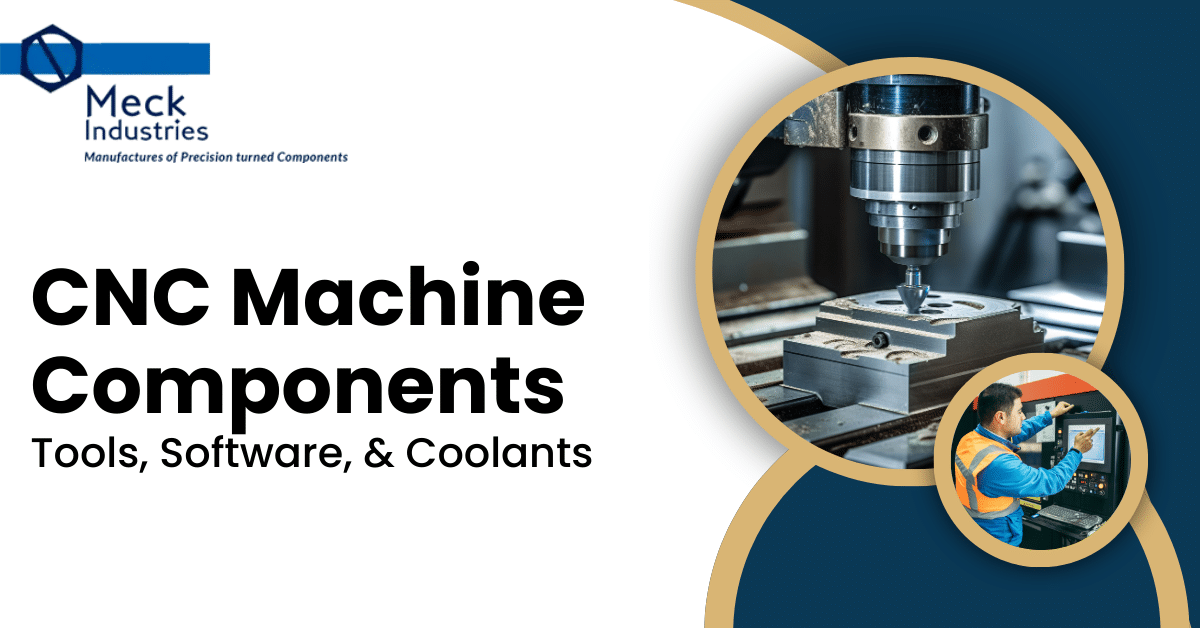
CNC (Computer Numerical Control) Machines have transformed modern manufacturing by Allowing for High Precision and Efficiency in Producing Complex Components. Understanding the Various Components of CNC Machines—Tools, Software, and Coolants is crucial for Manufacturers seeking to Optimize their Operations. This Article will Explore these Essential Components and their Roles in Ensuring Successful CNC Machining.
Essential Components of CNC Machines
CNC (Computer Numerical Control) Machines are sophisticated devices that transform Digital Designs into Precision-engineered Components. Understanding their Essential Components is crucial for optimizing performance and ensuring high-quality production. The Main Components of CNC Machines include:
- Machine Frame: The backbone of any CNC Machine, the frame provides stability and support for all other components, minimizing vibrations during operation.
- Motors: CNC machines utilize stepper or servo motors to control the movement of the machine’s axes, enabling precise positioning and speed control.
- Controller: The controller interprets G-Code, Translating Digital Commands into Physical Movements. It acts as the Brain of the CNC System, Coordinating Operations and ensuring Accuracy.
- Cutting Tools: Specialized Tools, such as End Mills and Drills, perform the Actual Cutting and Shaping of Materials. The choice of the tool directly impacts the Machining Process and the Quality of the Finished Product.
- Software: CNC Machines rely on Advanced Software for Design and Programming. CAD (Computer-Aided Design) Software is used for Creating Intricate Designs, while CAM (Computer-Aided Manufacturing) Software converts those Designs into Machine Instructions.
- Coolant System: Coolants are essential for dissipating Heat Generated during Machining. They enhance tool life and improve the quality of the machined components by reducing friction and preventing overheating.
By understanding these essential components, manufacturers can make informed decisions about their CNC Machinery, ensuring efficient and precise machining processes.
CNC Tools
CNC Tools are vital for executing the machining process, and they come in various types tailored for different applications:
- Cutting Tools: These include End Mills, Drills, Lathes, and Routers, each designed for Specific Tasks. For Example, End Mills are used for Horizontal and Vertical Cutting, while Drills create Holes.
- Tool Materials: The effectiveness of CNC Tools often depends on the material they are made from. High-speed Steel (HSS), Carbide, and Coated Tools (like Titanium Nitride) are popular due to their durability and resistance to wear.
- Tool Selection: Choosing the right tool is crucial for achieving the desired finish and precision. Factors such as the material being machined and the specific operation (cutting, drilling, or milling) must be considered.
- Maintenance: Regular Maintenance and Timely Replacement of tools are essential for maintaining machining accuracy and efficiency.
CNC Software
Software plays a critical role in CNC machining by controlling the machine’s operations and facilitating the design process:
- CAD and CAM Software: Computer-Aided Design (CAD) software is used to create detailed designs, while Computer-Aided Manufacturing (CAM) software converts these designs into machine-readable code (G-code).
- Programming: Effective programming is crucial for ensuring that the CNC machine follows the desired path and produces the correct specifications. Operators must be skilled in using these software applications to maximize productivity.
- Popular Software Options: There are numerous CNC software solutions available, each with unique features. Some well-known options include Autodesk Fusion 360, Mastercam, and SolidWorks, which cater to different levels of complexity and functionality.
- Software Updates: Keeping software updated ensures access to the latest features and improvements, ultimately enhancing machining capabilities.
Coolants and Lubricants
Coolants and lubricants are essential in CNC machining to enhance tool life and improve the quality of the machined components:
- Coolants: These fluids are used to dissipate heat generated during machining, preventing overheating and prolonging tool life. Common types of coolants include water-based solutions, oil-based fluids, and synthetic coolants, each with specific advantages.
- Lubricants: Lubricants reduce friction between the tool and the workpiece, minimizing wear and enhancing surface finishes. They can be used in conjunction with coolants for optimal performance.
- Selection Considerations: The choice of coolant and lubricant depends on the material being machined, the machining process, and environmental considerations. Proper selection can lead to improved machining efficiency and reduced costs.
Interplay Between Tools, Software, and Coolants
The synergy between CNC Tools, Software, and Coolants is crucial for optimal machining performance. For instance, using the right tool with the appropriate software settings ensures that the machining process runs smoothly. Additionally, selecting suitable coolants can significantly impact tool performance and component quality. Mismatches between these components can lead to issues such as increased wear, overheating, and poor surface finishes.
Frequently Asked Questions
What Types of Tools are Used in CNC Machining?
CNC Machining Uses various Tools, including End Mills, Drills, Lathes, and Routers, each designed for Specific Tasks.
How does CNC Software Function?
CNC Software, including CAD and CAM, is used to Design Components and Convert those Designs into Machine-readable Code that guides the Machining Process.
Why are Coolants Important in CNC Machining?
Coolants help dissipate Heat generated during Machining, Extending Tool Life, and Improving the Quality of the Machined Parts.
What Materials Are CNC Tools Made from?
CNC Tools are Commonly made from High-Speed Steel (HSS), carbide, and various coatings that enhance their durability and performance.
Conclusion
CNC Machines are indispensable in Modern Manufacturing, and Understanding their Components—Tools, Software, and Coolants—is vital for achieving Precision and Efficiency. By investing in High-quality Tools, Utilizing Advanced Software, and Selecting Appropriate Coolants, Manufacturers can enhance their Machining Operations and ensure the Production of high-quality Components. Embracing these Elements will help Organizations stay Competitive in the Ever-evolving Landscape of manufacturing.



